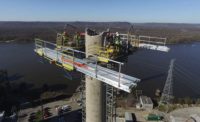Nuclear Power
Low-Price Competition Drives Ailing Nuclear Plants To Seek State Aid

Unit at Quad Cities nuclear plant complex in Illoinois may go into early retirement. Credit: Exelon
Exelon Corp. on May 6 said it would put into early retirement two Illinois nuclear power plants if there is no state support, voicing a concern shared by other U.S. owners facing financial woes from low energy prices.
The 1069-MW Clinton plant and the 1871-MW dual-unit Quad Cities unit, which have lost more than $800 million from low-cost natural-gas impacts, would close in mid-2017 and a year later, respectively, without passage of a bill introduced on May 5. Exelon proposes payments to the units for zero-carbon emissions.
“There are a number of plants dependent on the wholesale market asking for help due to economics,” says Paul Patterson, an energy analyst with Glenrock Associates. Exelon said it has voiced to state policymakers for several years the need to recognize nuclear power “as a reliable, zero-carbon source of energy.”
The legislation sought is similar to a plan proposed by New York Gov. Andrew Cuomo (D) to save two Lake Ontario plants that are set to close early: Exelon’s 597-MW Ginna plant next March and Entergy Nuclear’s 849-MW FitzPatrick unit at year-end.
“The governor recognizes something needs to be done in a market that doesn’t recognize the zero-carbon attributes of nuclear generation,” said Joseph Dominguez, Exelon executive vice president.
Regulators will introduce a framework in June that could keep Ginna open longer. But Entergy said it won’t save FitzPatrick, with officials noting a market that does not compensate nuclear-unit benefits. The utility’s Pilgrim plant in Massachusetts also is closing.
Other units in financial trouble include FirstEnergy’s 900-MW Davis-Besse, near Toledo.
Most regulated utilities such as Dominion Virginia Power are better able to value the benefits of their nuclear units’ zero-carbon emissions since the costs pass to ratepayers. Dominion is keeping its options open to build a new unit at the North Anna site, despite a potential $19-billion cost.
But others still face pressures. The Omaha Public Power District on May 12 recommended shutting the 478-MW Fort Calhoun nuclear unit under current market conditions, said CEO Tim Burke.



